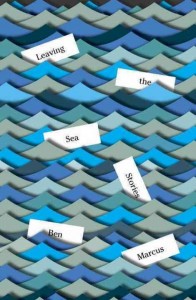
For all intents and purposes, Leaving the Sea is Ben Marcus’s first “true” short story collection. Arriving almost twenty years after his debut, The Age of Wire and String, the stories demonstrate an impressive and almost un-stomachable ability to jump from one style to the next, yet they’re watermarked with voices so uniquely Marcus’s own. When I had the chance to speak with him over the phone, I fanboyed-out about this dexterity and acuity, his stylistic hopscotching. “In some ways,” he said, “there’s a lot of shared sensibilities and deeper concerns in these stories, even though the technique to get there is different.”
The first section of stories in Leaving the Sea—“What Have You Done,” “I Can Say Many Nice Things,” “The Dark Arts,” and “Rollingwood”—are the most approachable in language and premise, and in the ones that follow, as Marcus says, “things get sicker at the level of language, more complex and less familiar.” But that’s not to undermine the complexity of the first four; these are the stories I find myself most attached to, the ones I continue to revisit. There’s something bleak and hysterical to be culled from each read, in much the same way one can both cry and cackle reading the stories of Lorrie Moore.
In “I Can Say Many Nice Things,” Marcus takes his protagonist on a cruise ship, away from his wife, where he’s instructing a creative writing workshop at sea and considering infidelity. In “The Dark Arts,” a medical tourist with an autoimmune disease finds himself receiving unapproved treatments overseas, staying in a men’s hostel where things get dicey after lights out. The premises invite what would seem to be diametrically opposed emotions on every page; for example, we can, in spite of ourselves, sympathize with the protagonist in “What Have You Done,” an allegedly-reformed pathological liar turned prodigal son who is so mired in his own narrative that he fails to recognize what the story seems to imply is his mother’s grave illness.
Annalisa Quinn, in her review of the book at NPR, gives a rather reductive—though not entirely inaccurate—reading of the collection, writing that Leaving the Sea “is made up of Sad Guy stories: Maybe he’s sick, he’s definitely lonely, and he’s probably a whiner.” But I was drawn to her closing line, which posits that Marcus’s stories ask readers to “empathize against [their] will.” And I can’t think of a better task for a writer of fiction, or a reader of one, for that matter. That Marcus can inspire such a reaction is testament to his keen ability to mine the sweet spot of funny language without obfuscating the reader’s opportunity to connect with the story in a deep, meaningful way. If it seems like magic, Marcus is quick to demystify. “It’s trial and error,” he says, “and error mostly.”
As one moves throughout the collection, the world does indeed seem “less familiar” than it once had, but even in these stories that feel a bit removed from our understanding of reality, Marcus is able to convey such recognizably human emotions so as to blur the line between the familiar and the uncanny. The title story, for example, a six-page, one-sentence epic, exists in a world all its own, but the reader cannot help but feel gut-punched when its narrator offers a sentiment like, “I would have gills if I were something better that had never tried to leave the sea.” Strip a story like “The Loyalty Protocol” of its unusual premise—a community farcically obsessed with preparing for disaster—and you’re still going to recognize that sense of longing, disconnectedness, and loss that each of the stories in this terrific collection finds itself in conversation with.
Ben Marcus will be reading at Bookpeople in Austin, TX on February 11th at 7PM.
Vincent Scarpa is a Michener Fellow at the University of Texas. His fiction has appeared or is forthcoming in Hayden’s Ferry Review, The Baltimore Review, and Plain China: Best of Undergraduate Writing. He is the 2012 recipient of the Norman Mailer College Fiction Award.